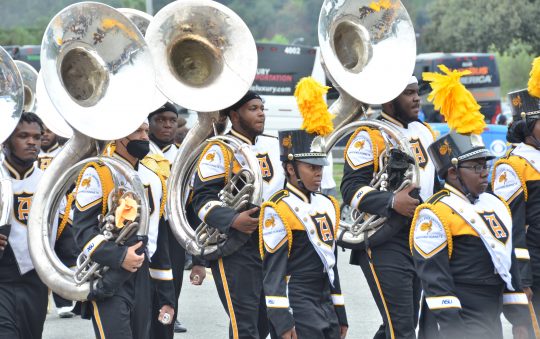
The L.A. Sentinel interviewed Dr. Auzout-Settle, the director of the California Community Colleges (CCC) Transfer Pathway to Historically Black Colleges and Universities (HBCUs), to gain insight into their offerings, successes, and new initiatives.
At its core, the CCC to HBCU Transfer Agreement is a partnership between the 116 Community Colleges in California and nearly 40 HBCUs around the country. The program allows any CCC student with a 2.0 GPA and 30 UC/CSU credits (or an Associate’s degree for transfer) a guaranteed acceptance into any partner HBCUs.
Some partner HBCUs include Bethune-Cookman University, Clark Atlanta University, Dillard University, Fisk University, Grambling State University, North Carolina Central University, and Texas Southern University.
Related Stories:
https://lasentinel.net/hbcus-need-the-lobbying-support-of-their-students-and-alumni.html
https://lasentinel.net/hud-announces-5-5-million-award-for-hubcus-for-research.html
Besides guaranteed admission, the program boasts a plethora of additional advantages including application fee waivers, pre-transfer advisement, priority consideration for campus housing, and priority consideration for scholarships for students with a 3.2 GPA or higher. New legislation (AB1400: Cal-HBCU Transfer Grant, 2023) provides $5,000 to eligible transfer students, and the Hoffman Agency Scholarship provides a student with full tuition and fees for their junior and senior year.
Auzout-Settle recalled the birth of the program and the woman who fought for its inception, Howard University alumna Elaine Moore. In the early 2010s, transfer students were faced with an obstacle plaguing many schools in California: impaction. Impaction occurs when a campus is at enrollment capacity and cannot accommodate the eligible undergraduate applications that it receives.
As a strong proponent of HBCUs Moore aimed to make the transfer process more seamless for these California students who were looking at institutions outside of their home state. She visited HBCUs around the country and developed this transfer agreement with the program’s first nine HBCU partner institutions.

Through serendipitous word of mouth and years of hard work, HBCU interest in the program grew into nearly 40 committed partner schools. Dr. Auzout-Settle believes her team was a substantial factor in their success.
“[HBCUs] are sacred intuitions who are protective over their students, so when you have outsiders [like our program] who are trying to engage in partnerships, there is often a bit of skepticism. When [the HBCU representatives] get to know us, they find working with our team to be very comfortable and familiar,” she said.
This relationship has fostered an environment where CCC participants can achieve their dreams – the program successfully transferred 450 students to HBCUs with 150 of them already graduated. Annually, the team participates in and creates hundreds of events (virtual and in-person) for students, CCC Counselors, and partner HBCUs.
“We present so many virtual webinars, particularly to help students. Students always hear ‘do your research’ when choosing a school, but they don’t always know how. So, we have webinars like ‘Funding Your HBCU Education, Transferring with a Family, and Personal Statement Support Auzout-Settle explained.
The in-person event offerings are similarly vast. Besides participating in most CCC transfer fairs, the CCC to HBCU Program sends representatives to the Umoja Conference, the A2MEND Summit, and the Black College Expo. The program also created two semi-annual events – a fall caravan where partner HBCU representatives and CCC to HBCU Program staff travel throughout California for on-site transfer fairs (offering on-site admission and scholarships), and the second offering is a summer summit (held in Charlotte, NC this year) to deepen relations with partner HBCUs, host an awards ceremony, inform CCC Counselors about the program, and tour nearby partner HBCUs.
In anticipation of the 10th year anniversary in 2025, Auzout-Settle and her team are brainstorming how to celebrate the monumental occasion. She acknowledges that the student success is at the core of the celebration.
“The beauty of the work is really seeing the transformation in these students…from the transfer fair, them applying, going to the HBCU, graduating, to entering their careers or going to graduate school. It really inspires us to do the work and keep doing the work,” she said.
Learn more about the program:
https://www.californiacommunitycollegehbcutransfer.com/
Instagram: https://www.instagram.com/ccctransfer2hbcu/







